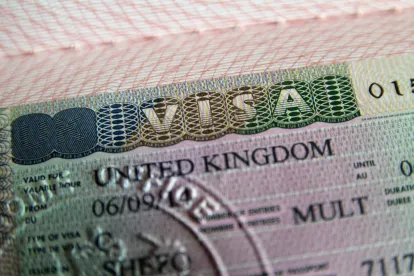The UK Home Office published a Statement of Changes to the Immigration Rules, including a reduced waiting period for graduating students to switch from Tier 4 to Tier 2 and the proposed issuance of electronic entry clearances.
On December 7, 2017, a Statement of Changes to the United Kingdom’s Immigration Rules was announced. A summary of the most relevant changes for employers follows.
Tier 2 (General)
This category allows UK companies to sponsor non-European Economic Area (EEA) nationals to work in skilled roles in the UK. The main changes of which employers should be aware include the following:
-
It will be possible for Tier 4 (General) students to apply to switch into Tier 2 (General) as soon as they have completed their degree courses. Under the current rules, non-Ph.D. students must wait until they have received their final results before applying to switch into Tier 2 (General). This waiting period often has an impact on graduates’ start dates and the change will allow for greater flexibility.
- Restrictions relating to how far a Tier 2 (General) migrant’s start date can be pushed back after leave has been granted are being introduced in the Immigration Rules (such restrictions are currently in the Home Office Sponsor Guidance only). The start date for employment cannot be pushed back by more than 28 calendar days.
- A new exemption from the Resident Labour Market Test is being added for roles that fall within the Standard Occupational Codes for “Researchers.”
- Pay rates for health sector workers across the UK are being brought in line with pay scales in England.
- Provision is being made to allow nurses to continue to be sponsored under Tier 2 (General) if they are undertaking an approved program with a view toward returning to practice.
These changes will become effective January 11, 2018.
Indefinite Leave to Remain
Where an individual has accrued five years’ residence in the UK on a qualifying Points-Based System (PBS) visa, he or she may be eligible to apply for Indefinite Leave to Remain (ILR) and any accompanying dependent family members (PBS dependents) may be included in such application.
Under the current rules, the main applicant is subject to a continuous residence requirement and must be able to demonstrate that he or she has had no more than 180 days’ absence from the UK in any 12-month period.
From January 11, 2018, partners of PBS migrants will also be subject to the 180 days’ absence requirement. This will not be retroactive and therefore will apply only to absences from the UK during periods of leave granted under the rules in place from January 11, 2018. PBS migrants and their family members are advised to maintain schedules of absences.
In addition, other changes to be aware of include the following:
- Provided that Tier 2 (General) migrants have held valid leave at all times, they will no longer be required to have been continuously employed throughout the qualifying five-year period in order to be eligible for ILR.
- Flexibility is being introduced relating to how the end date of the five-year continuous period is calculated. The end date will now be based on one of the following (depending on which is most beneficial for the applicant): the date of application, the date of decision, or any date up to 28 days after the date of application.
- The 180 days’ absence from the UK will now be calculated on a 12-month rolling basis (under the current rules absences are calculated in 12-month periods counting back from the date of the ILR application).
Tier 1 (Exceptional Talent)
This category is for talented individuals in the fields of the arts, science, humanities, engineering, and digital technology to work in the UK without sponsorship from a UK company. Applicants must be endorsed by a Designated Competent Body (DCB), e.g., the Arts Council, which has a limited number of endorsements to issue per year. The main changes are set out below:
-
The number of places for endorsement by a DCB will double from 1,000 to 2,000 per year.
- The extra 1,000 endorsements will not be allocated evenly among the DCBs but will be allocated according to need.
- Migrants who are endorsed under a DCB’s exceptional talent criteria will qualify for ILR in the UK after three years’ continuous residence (those endorsed under a DCB’s exceptional promise criteria will continue to qualify for settlement after five years of continuous residence).
- A simpler application process is being introduced for applicants who hold specific peer-reviewed fellowships or have been appointed to senior academic or research posts.
Electronic Entry Clearances
The UK government proposes to commence issuing entry clearances in electronic form. Under current rules, entry clearance must be endorsed in a valid passport or other identity document. The amendment to the rules will allow the entry clearance to be issued both in electronic form and by endorsement in a valid passport or identity document.
Upon entry to the UK the visa holder will simply present his or her passport to Immigration Control, which will check the individual’s immigration status electronically. As per the current process, the individual will then collect his or her biometric residence permit (BRP) as evidence of immigration status.
Electronic entry clearances will initially be trialled with specified groups with a view toward generally introducing entry clearances in electronic form at a subsequent date, although this date is yet to be specified.




 />i
/>i

